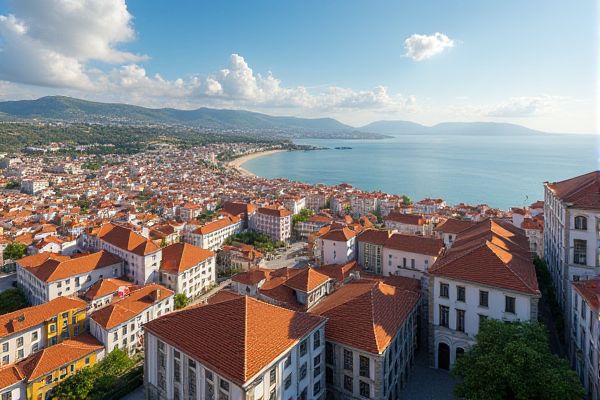
Employment opportunities in Portugal: Growing tech industry. Startup-friendly environment. High demand for multilingual professionals. Seasonal tourism jobs. Competitive job market. Network for job opportunities. Work visa requirements. Language barriers in smaller companies. Remote work trend increasing. Lower average salaries compared to Northern Europe.
Growing tech industry.
The tech industry in Portugal is booming in 2024, with Software Developers being the most in-demand role, driven by growth in fintech, telecommunications, e-commerce, and healthcare. It offers average salaries of $61,608 along with benefits like health insurance and flexible work options. Major tech hubs in Lisbon and Porto are seeing significant expansion, with government initiatives and favorable visa options attracting international tech professionals. For more insights into this trend, visit the Nucamp blog that delves into the rising opportunities and the future of the tech workforce in Portugal.
Startup-friendly environment.
Portugal's startup ecosystem offers robust employment opportunities, with over 4,000 active startups employing around 25,000 people. The government's supportive regulatory environment, investment incentives, and initiatives like Startup Portugal and various incubators and accelerators create a fertile ground for entrepreneurial talent and innovation.
High demand for multilingual professionals.
There is a high demand for multilingual professionals in Portugal, particularly in roles such as content moderation, customer service, sales, and marketing. With various job opportunities available in Lisbon that cater to speakers of multiple languages including Norwegian, Italian, Polish, Russian, Czech, Greek, and German, professionals can explore numerous openings at Multilingual Vacancies.
Seasonal tourism jobs.
Seasonal tourism jobs in Portugal are abundant, particularly in the hospitality sector, including roles as resort reps, hotel staff, and workers in bars and restaurants, often with opportunities for commission and provided accommodation. These jobs are available mainly from June to September and offer a chance to interact with tourists and locals, making them ideal for those looking to immerse themselves in the culture. For more information on these opportunities, you can visit Anywork Anywhere which offers insights into working during the summer months in Portugal.
Competitive job market.
Portugal's job market is highly competitive, characterized by low unemployment rates driven by strong demand in sectors such as Information and Communication Technologies, Business Support Centers, Healthcare, Hospitality, Agriculture, Construction, and Renewable Energy. The government's investments in job creation initiatives, favorable corporate tax laws, and a booming tourism industry have all contributed to this robust labor market. For more detailed insights and forecasts, you can visit the Job Outlook page from Y-Axis.
Network for job opportunities.
When seeking job opportunities in Portugal, it's beneficial to make use of various platforms and resources to increase your chances of success. A good starting point is digital networks such as LinkedIn, which are invaluable for connecting with potential employers and learning about job vacancies. For EU/EFTA citizens, platforms like EURES provide a tailored approach to job searching. Portuguese-specific job sites such as SAPO Emprego, Expresso Emprego, and JobsinLisbon cater to diverse sectors, including technology, tourism, and customer service. Additionally, the Portuguese Public Employment Service, known as Instituto do Emprego, and its extensive network of local employment services offer another layer of opportunity. As highlighted on the Expatica website, resources such as social networks and job-specific sites like Net-Empregos, Indeed Portugal, and specialized platforms like ItJobs and Turijobs offer tailored services for various industries. Job seekers can also consider recruitment agencies such as Michael Page and Hays Portugal to broaden their search.
Work visa requirements.
Non-EU nationals aspiring to work in Portugal must secure a job offer from a Portuguese employer, ensuring that the job has been advertised for at least one month. The necessary documentation includes a valid passport, passport-size photos, evidence of sufficient funds, criminal records, health insurance, proof of accommodation, and an employment contract. It is imperative that the employer initiates the process by applying for a Work Permit. Subsequently, the applicant must seek a Work Visa at the Portuguese Embassy, followed by obtaining a Residence Permit upon their arrival in Portugal.
Language barriers in smaller companies.
Smaller companies in Portugal face significant language barriers, with many experiencing lost business opportunities due to deficient language skills, estimated at an average loss of EUR325,000 per business over a three-year period. These barriers highlight the need for a robust Language Strategy to facilitate better communication and support the mobility of labor, goods, and services.
Remote work trend increasing.
In Portugal, remote and hybrid work models are increasingly popular, with over a million people working remotely in the second quarter of 2024. There has been a significant 19.2% increase in hybrid models from the previous year, particularly among women, older workers, and those in the service sector with higher education. For more detailed insights into this transition, you can visit Portugal Decoded and explore the factors driving this shift in work dynamics.
Lower average salaries compared to Northern Europe.
In Portugal, the average monthly net salary is approximately EUR1,053 and the average monthly gross salary is around EUR1,679, which is significantly lower compared to many Northern European countries. This significant disparity highlights the economic variances across Europe. To gain further insights into salary comparisons and economic contexts across the continent, you can explore detailed analyses and up-to-date information on Eurodev's blog on Average Salaries in Europe.
